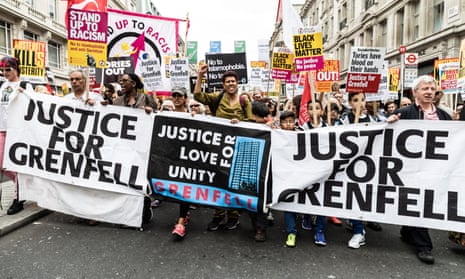Those affected by the Grenfell tower fire might boycott the inquiry into the disaster if the proposed scope is not widened, campaigners have said.
Sir Martin Moore-Bick, who will lead the investigation, had previously said he was “doubtful” the investigation would be far-reaching enough to satisfy those who survived the blaze.
The current proposals are for the inquiry to look at how the fire started and how it developed so rapidly, but calls have been made for the investigation to be broadened.
Yvette Williams, one of the organisers of the Justice 4 Grenfell campaign group, said survivors and victims’ families were “very, very angry” and wanted the “systemic issues” related to the fire to be looked at as part of the inquiry.
“They cannot just look at 14 June, when that building became an inferno. They can’t do that,” she told Sky News. “If we don’t get good terms of reference for the public inquiry and we don’t get a wide remit so that those people can take responsibility for what they’ve done, then we won’t participate in it.”
It follows Labour leader Jeremy Corbyn writing to Prime Minister Theresa May, urging her to widen the scope of the public inquiry. He has asked for a two-part inquiry, the first looking at specific issues regarding the fire at the 24-storey building in Kensington, west London, and reporting back soon, with a second part “looking at the national issues”.
On Saturday, communities secretary Sajid Javid agreed with council leader Nicholas Paget-Brown’s decision to resign after intense criticism of how the Grenfell Tower tragedy was handled. Javid said: “It is right the council leader stepped down given the initial response to the Grenfell tragedy.
“The process to select his successor will be independent of government, but we will be keeping a close eye on the situation. If we need to take further action, we won’t hesitate to do so.”
Paget-Brown said he had to share responsibility for “perceived failings”, departing alongside deputy Rock Feilding-Mellen. The council has now been hit by three high-profile resignations in the aftermath of the fire, with chief executive Nicholas Holgate also leaving.
The authority came under fire for its slow response to the disaster, in which at least 80 people are thought to have died. The Labour party launched a drive for the council to relinquish its handling of affairs until the crisis was brought under control, with a string of party figures weighing in.
London mayor Sadiq Khan, who welcomed the resignation, said the government had no option but to appoint “untainted” commissioners who had “a genuine empathy for local people and the situation they face” to take over running the authority. He said: “The council now needs to find a way to move forward and find a way to restore the confidence in that community.
“That can only be done with new leadership and a new approach that reaches out to residents who quite rightly feel desperately neglected.
“I ... feel the response from the council and subsequent breakdown in trust is so severe that there is now no alternative and the Government needs to step in quickly.”
Commissioners were brought in to run Tower Hamlets Council in 2014 after a critical independent report into the council’s award of grants and sale of properties under former mayor Lutfur Rahman.
Shadow housing secretary John Healey said the move would amount to “specific, immediate, obvious and necessary action”, while shadow communities secretary Andrew Gwynne added the powers should be used to “get a grip on what has gone dreadfully wrong”.
In his resignation statement, Paget-Brown acknowledged the council had been criticised for “failing to answer all the questions that people have” but that the scale of the tragedy “was always going to mean that one borough alone would never have sufficient resources to respond to all the needs of the survivors and those made homeless, on its own”.
